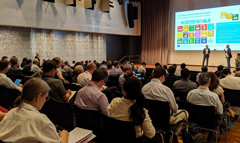International conference in Germany: CO2 utilization – a research magnet
Carbon dioxide as a new raw material and substitute for crude oil / Scientists from all over the world see great potential / Five-day meeting co-organized by Covestro

Scientists from all over the world discussed at an international conference in Aachen, Germany how CO2 can make the chemical industry less dependent on oil.
From greenhouse gas to useful raw material: At a major conference in Aachen, Germany, numerous scientists from all over the world discussed how CO2 can make the chemical industry less dependent on oil. During the five-day meeting, it became clear yet again that this topic has great potential. For example, carbon dioxide from industrial exhaust gases and even from the atmosphere can be used to produce high-quality chemicals, plastics or fuels. This could be used to create a closed carbon cycle in the long term as a central element of a circular economy. The conference was co-organized and co-sponsored by materials manufacturer Covestro, which sees itself as a pioneer in the use of CO2.
The 17th “International Conference on Carbon Dioxide Utilization” (ICCDU) was held under the motto “From Science to Application”. “We are delighted that numerous creative ideas for the use of CO2 have already resulted in innovative products and processes that are being marketed by large industrial companies as well as agile start-ups. These are promising steps to make chemistry even more sustainable,” said Walter Leitner, Professor at RWTH Aachen University and Director at the Max Planck Institute for Chemical Energy Conversion and one of the ICCDU Chairmen.
Cooperation as the key to success
Co-Chairman Dr. Christoph Gürtler, Head of Catalysis Research at Covestro, added: “CO2 is a very inert molecule which makes it anything but easy to use. The key to success lies in the cooperation between application-oriented science and research-based industry.” With this approach, Covestro, for example, succeeded in developing a platform technology in close cooperation with RWTH Aachen University to use CO2 as a building block for foam and other plastics.
One particular focus of the conference was the coupling of carbon dioxide and electricity from renewable energy sources. Through this process, fuels and important chemical building blocks such as methanol, formaldehyde or formic acid can be produced in a particularly sustainable manner. “The ‘decarbonization’ of energy generation by wind and solar plants with the help of the greenhouse gas CO2 can contribute to the ‘defossilization’ of the chemical industry,” emphasized Professor Leitner.
About Covestro
With 2018 sales of EUR 14.6 billion, Covestro is among the world’s largest polymer companies. Business activities are focused on the manufacture of high-tech polymer materials and the development of innovative solutions for products used in many areas of daily life. The main segments served are the automotive, construction, wood processing and furniture, and electrical and electronics industries. Other sectors include sports and leisure, cosmetics, health and the chemical industry itself. Covestro has 30 production sites worldwide and employs approximately 16,800 people (calculated as full-time equivalents) at the end of 2018.
Source: Covestro, press release, 2019-06-28.
